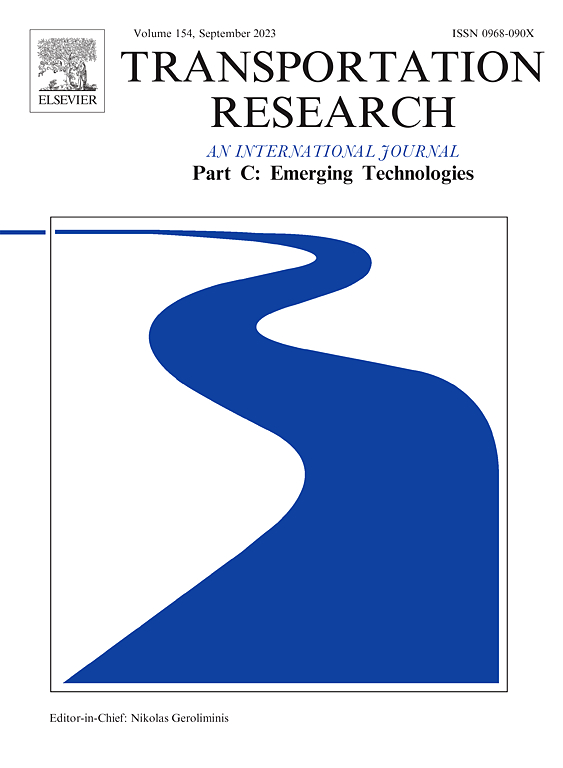Reinforced stable matching for Crowd-Sourced Delivery Systems under stochastic driver acceptance behavior
IF 7.6
1区 工程技术
Q1 TRANSPORTATION SCIENCE & TECHNOLOGY
Transportation Research Part C-Emerging Technologies
Pub Date : 2024-11-15
DOI:10.1016/j.trc.2024.104916
引用次数: 0
Abstract
Crowd-Sourced Delivery Systems (CDS) depend on occasional drivers to deliver parcels directly to online customers. These freelance drivers have the flexibility to accept or reject orders from the platform, leading to a stochastic and often unstable matching process for delivery assignments. This instability results in frequent rematching, delayed deliveries, decreased customer satisfaction, and increased operational costs, all highlighting the critical need for improved matching stability within CDS. While traditional stable matching theory provides a foundation, it primarily addresses static and deterministic scenarios, making it less effective in the dynamic and unpredictable environments typical of CDS. Addressing this gap, this study extends the classic Gale–Shapley (GS) stable matching algorithm by incorporating tailored compensations for drivers, incentivizing them to accept assigned orders and thus improving the stability of matchings, even with the inherent uncertainties of driver acceptance. We prove that the proposed mechanism can generate reinforced stable matching results based on tailored compensation values. Also, our numerical study shows that this reinforced stable matching approach significantly outperforms traditional methods in terms of both matching stability and cost-effectiveness. It reduces the order rejection rate to as low as 1% and cuts operational costs by up to 18%.
随机驾驶员接受行为下众包配送系统的强化稳定匹配
众包配送系统(CDS)依靠临时司机直接向在线客户配送包裹。这些自由职业司机可以灵活地接受或拒绝来自平台的订单,导致配送任务的匹配过程随机且经常不稳定。这种不稳定性导致了频繁的重新匹配、交货延迟、客户满意度下降和运营成本增加,所有这些都凸显了在 CDS 中提高匹配稳定性的迫切需要。虽然传统的稳定匹配理论提供了一个基础,但它主要解决的是静态和确定性的情况,因此对 CDS 典型的动态和不可预测的环境不太有效。针对这一缺陷,本研究扩展了经典的盖尔-沙普利(Gale-Shapley,GS)稳定匹配算法,为司机提供了量身定制的补偿,激励他们接受分配的订单,从而提高了匹配的稳定性,即使司机接受订单存在固有的不确定性。我们证明了所提出的机制可以在定制补偿值的基础上生成强化的稳定匹配结果。同时,我们的数值研究表明,这种强化稳定匹配方法在匹配稳定性和成本效益方面都明显优于传统方法。它将订单拒绝率降低到了 1%,并将运营成本削减了 18%。
本文章由计算机程序翻译,如有差异,请以英文原文为准。
求助全文
约1分钟内获得全文
求助全文
来源期刊
CiteScore
15.80
自引率
12.00%
发文量
332
审稿时长
64 days
期刊介绍:
Transportation Research: Part C (TR_C) is dedicated to showcasing high-quality, scholarly research that delves into the development, applications, and implications of transportation systems and emerging technologies. Our focus lies not solely on individual technologies, but rather on their broader implications for the planning, design, operation, control, maintenance, and rehabilitation of transportation systems, services, and components. In essence, the intellectual core of the journal revolves around the transportation aspect rather than the technology itself. We actively encourage the integration of quantitative methods from diverse fields such as operations research, control systems, complex networks, computer science, and artificial intelligence. Join us in exploring the intersection of transportation systems and emerging technologies to drive innovation and progress in the field.

 求助内容:
求助内容: 应助结果提醒方式:
应助结果提醒方式:


